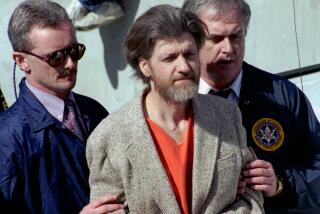Unabomb Suspect May Have to Give Writing Samples
- Share via
SACRAMENTO — Unabomber suspect Theodore J. Kaczynski may be required to provide additional handwriting samples to federal prosecutors seeking to authenticate journals seized when he was arrested last year at his Montana cabin.
Over objections by Kaczynski’s lawyers, U.S. Magistrate Gregory G. Hollows on Thursday indicated that he is leaning toward requiring the former UC Berkeley mathematics professor to provide a limited number of writing samples.
After a 40-minute hearing, Hollows said he might give prosecutors the chance to “take your best shot” during two, two-hour handwriting sessions at which Kaczynski would replicate some phrases apparently found in the seized journals.
The magistrate did not issue a final ruling, but his office later said it was expected to be made public next week.
Kaczynski, 54, a Harvard University-trained mathematician, is charged in the Sacramento slayings of computer store owner Hugh Scrutton in 1985 and timber industry lobbyist Gilbert Murray in 1995.
The attacks are believed by the government to be part of a coast-to-coast, 17-year reign of violence that triggered one of the most intensive manhunts in U.S. history, with FBI agents investigating thousand of tips that led them from junkyards to universities before Kaczynski’s arrest in April.
During the hearing, attorneys for Kaczynski, who was not present, agreed that some 800 pages of handwritten letters from their client to his family were, in fact, written by Kaczynski.
Hollows asked prosecutors why they needed more. “I can’t imagine that in 800 pages you don’t have all the letters in the alphabet or the letter combinations,” he said.
But government prosecutors maintained that those samples were not completely adequate for the comparisons they are seeking to make before a trial, now scheduled to begin in November.
One key issue is whether more handwriting samples would put Kaczynski in the position of helping prosecutors convict him.
“They are asking Mr. Kaczynski to create evidence,” defense attorney Judy Clarke told Hollows. “There are limits,” she said, to how far her client must go “in assisting the government in the case against him.”
Moreover, defense lawyers argued, “the government fails to point to even a single example of how the known samples are not ‘completely’ sufficient to determine whether Mr. Kaczynski wrote the documents found in his cabin.”
Assistant U.S. Atty Bernard F. Hubley countered by saying that Kaczynski “has no 4th or 5th Amendment right” to refuse the handwriting samples.
In seeking more writing samples, prosecutors said investigators who searched the cabin seized a substantial number of documents written in English, Spanish and numeric code that bear on Kaczynski’s guilt and they expect to enter the documents as evidence at Kaczynski’s trial.
“As foundation for the introduction of the documents at trial, the government must present some evidence that the defendant wrote the seized documents,” prosecutors argued.
In September, Assistant U.S. Atty. Robert Cleary, the lead prosecutor in the case, said during a hearing that in a handwritten journal found at the cabin, Kaczynski tied himself directly to the bombings and expressed “his desire to kill.”
It was unclear Thursday whether that was among the phrases prosecutors would ask Kaczynski to duplicate.
Cleary also would not comment on whether investigators have broken the code. “I don’t want to talk about details of the evidence,” he said.
If Hollows agrees to their request, prosecutors said they would type out the text and ask Kaczynski to duplicate the words in his own hand. Hollows indicated that a defense handwriting expert could be present as an observer.
More to Read
Sign up for Essential California
The most important California stories and recommendations in your inbox every morning.
You may occasionally receive promotional content from the Los Angeles Times.












